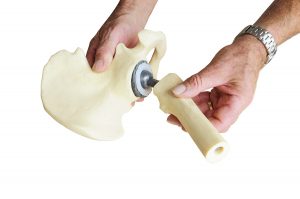
DAVE WATTS, MD
Orthopedic Surgeon
The most common myths about hip replacements

Choosing to have hip surgery can be a difficult decision that includes a lot of fear and confusion weighing you down. Whether you are the patient or you are helping a loved one prepare for their procedure, you will want to make sure you have thorough and accurate information.
The easiest way to sort out the facts is to talk to your doctor. Before scheduling a consultation, prepare yourself with some questions and review some of the most common myths associated with hip replacement surgery.
Only One Option
With most ailments, there are innumerable ways to approach healing. Surgery should not be your first choice but rather your last, making sure you have exhausted all of your other options.
Once you and your doctor settle on surgery, there are still several approaches to hip replacement including the minimally invasive posterior approach, direct anterior approach, and arthroscopies. What worked for friends and family might not be right for you. The best techniques vary from person to person. Work with your doctor to choose a method that meets your needs.
Replacing a Hip Due to Injury
It is common for people to draw a connection between injury and surgery. While fractures and broken bones can require a replacement, most hip replacement surgeries are in response to degenerative disorders like arthritis.
If you find yourself in constant pain that hinders your daily activities or you have a condition that is worsening, it is probably best to consider surgery.
Waiting Until You Can’t Walk
Some folks think of surgery as an extreme measure to deal with a severe ailment. In their mind, if they are only experiencing mild pain it is best to put off seeing a doctor, much less undergo surgery.
On the contrary, the reasonable thing to do is consult with a hip pain doctor. If the pain is affecting your daily routine, surgery may be a viable option.
Avoiding Physical Activity
Pain often convinces patients that they should remain as sedentary as possible to avoid further injury. In actuality, building up muscle, working on flexibility, and losing weight are all great ways to prepare for surgery.
Having maintained your physical health before surgery significantly helps with the recovery process after, placing less stress and strain on your body and allowing it to comfortably adjust to your new hip.
Good as New
Many people believe surgery solves their aches and pains immediately. While a new joint can be life-changing, it does not instantly solve all of your problems. You will be excited by your new lease on life, but it is essential to the healing process that you ease back into activities.
After surgery, your doctor will set you up with a healing plan that includes a gradual increase in activity paired with physical therapy. If you follow this regime in the months after your surgery, you will be up and around before you know it.
There are a number of knowledgeable orthopedic doctors in Sioux Falls SD ready to answer your questions today!